Matched Betting: Profit Squad Review
I’ve discussed matched betting a few times on Pounds and Sense. Despite the name it’s not gambling but a genuine way of making a risk-free sideline income.
Matched betting involves (legally) taking advantage of bookmaker special offers. By doing this you can generate a guaranteed profit for no risk, regardless of how the event/s you are betting on pan out.
You can read my post about how matched betting works here, and my post about why I believe matched betting is particularly suitable for older people here.
Although it’s not essential to subscribe to a matched betting advisory service, if you are new to betting in particular it is highly advisable. There are various services, the best known of which include Profit Accumulator and Odds Monkey. Today, however, I want to look at a rival service called Profit Squad, which has its own unique set of tools and features, and in my view is especially suitable for people who already have some knowledge of matched betting. That being said, it also has all the advice, tools and information someone new to matched betting would require.
Profit Squad were kind enough to give me complimentary membership of their service so I could see what they have to offer. Here’s what I found…
First Impressions
Profit Squad is now owned by the same company that runs MatchedBets.com (which I reviewed here), so you may not be surprised that there are some similarities in appearance between the sites. While MatchedBets.com has a rather garish colour scheme, however, Profit Squad (see below) is more restrained. Personally I prefer this, as it makes the site look more professional, as well as being more readable.
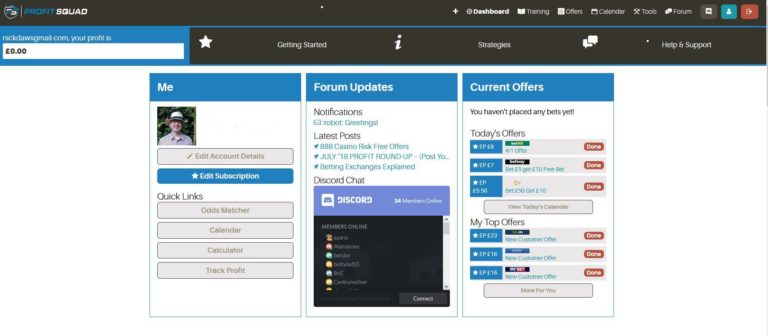
As you will see, the main navigation menu is at the top right of the screen. If you hover the cursor over Offers or Tools, a sub-menu will appear. It’s all quite logical and intuitive.
As with all matched betting advisory services, the site is organized into a number of sections. The main ones are listed below:
- Training
- Offers
- Tools
- Calendar
- Forum
I’ll look at each of these in a bit more detail below.
Training
This is (of course) the training area of Profit Squad, and is the place where new matched bettors should start. It is neatly and attractively set out. There are 22 articles here, covering everything from how to get started in matched betting to reload offers and advanced strategies (including online casinos)..
The articles consist mainly of text and screen captures, with videos also used in some cases. I found the articles clear and well written. While I am already familiar with the basics of matched betting, I found some of the articles (e.g. on each-way dutching and how to profit from online slots) genuinely eye-opening.
Offers
This is divided into sub-sections, including:
- New Customer Offers
- Existing Customer Offers
- Accumulator Offers
- Free Bet Clubs
- Horse Racing Offers
- Casino Offers
- Advanced Casino Offers
These are all pretty self-explanatory. In New Customer Offers, for example, all such offers are listed in order of expected profit, the highest first (see below).

Clicking on Instructions takes you to detailed instructions on how to apply the offer. These generally include a short video plus written instructions. Again, I thought these were very clear, and I like the way the key points of each offer are set out in checklist form at the top of the page.
Offer Calendar
This is a feature of Profit Squad I really like. Just by visiting the Calendar page you can see all the day’s recommended offers, along with the expected profit and a link to full instructions for doing them.
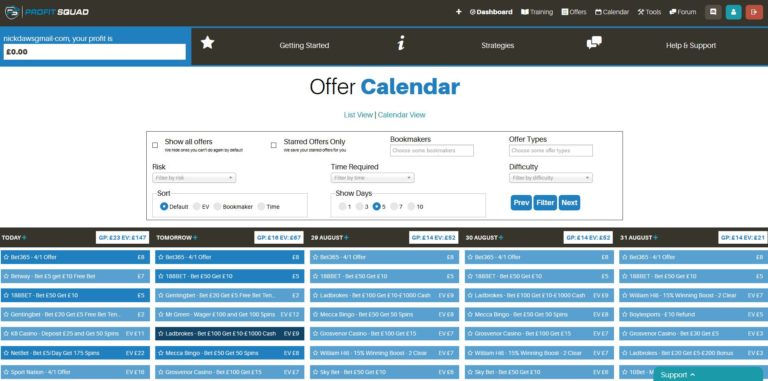
Odds Matcher
Of course, every matched betting service needs an odds-matching tool, which helps you find the best bets for matched betting offers. Here’s a capture of the one provided by Profit Squad.
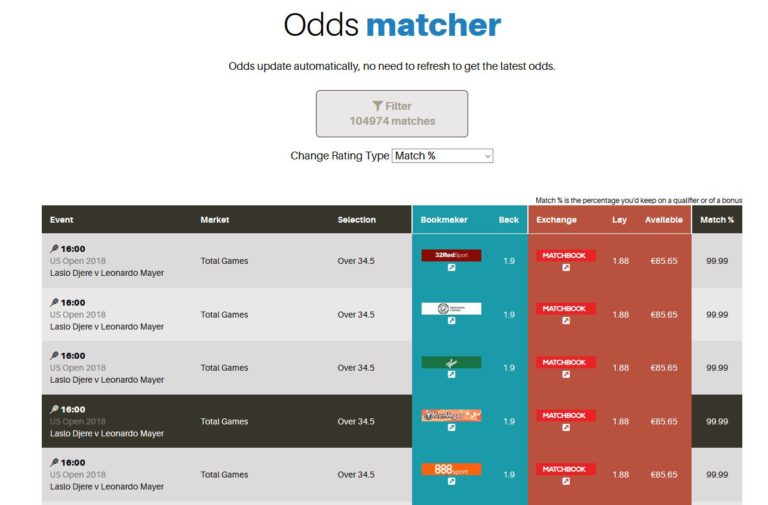
As you would expect, you can filter results according to sport, odds (minimum or maximum), start time, odds percentage, liquidity available at the exchange, and so on.
One feature I particularly like is that odds are shown in real time, so you don’t have to keep refreshing the screen. This also avoids the situation that can occur using other odds matching software (e.g. on Profit Accumulator) where the information frequently lags behind, so you think you have found a great match only to discover it has already gone.
Acca Backers
As mentioned in this blog post a few months ago, accumulator offers are a particular favourite of mine. These are where you take advantage of bookmakers’ offers to refund your stake if one leg of your accumulator loses. This gives punters an in-built edge and means they should enjoy steady profits so long as they back and lay appropriately.
Profit Squad’s accumulator software offers four different ways to make money from accumulator offers: Lay Sequential, Lay at Start, Lay With Lock-In, and No Lay. All four methods are explained in the Training area, mentioned earlier. This is more advanced than other platforms’ accumulator tools, which typically only offer three options.
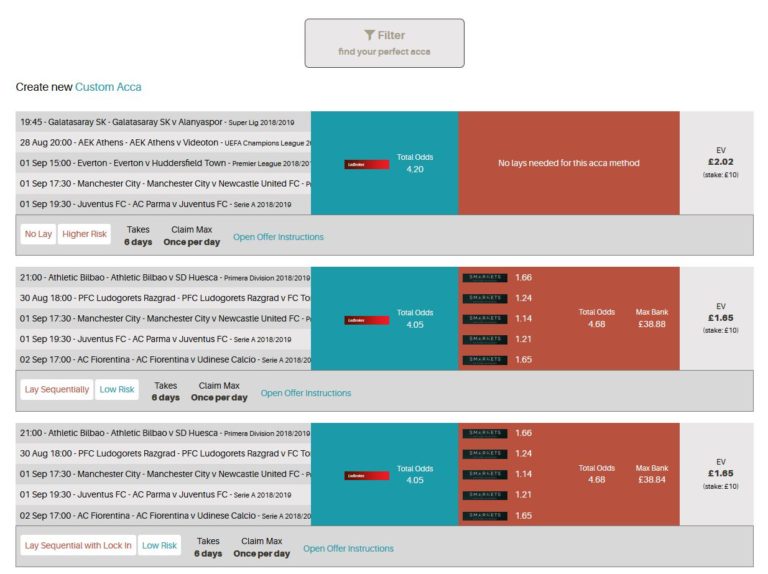
As you may have noticed, with Profit Squad by default you see all four types of offer listed according to their expected value (average profit generated). However, if you prefer one particular type of acca (e.g. Lay With Lock In, which I prefer personally) you can set the filter to show only this type.
Horse Racing Matcher
This tool is provided for use with horse racing offers, e.g. your money back if your horse is second to the SP favourite. By careful backing and laying you can generate a good return when a refund is triggered and a small qualifying loss otherwise, hopefully producing steady profits overall.
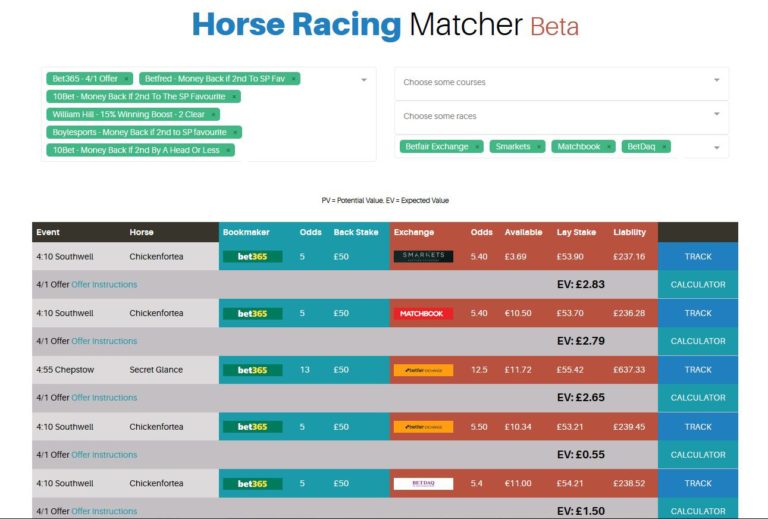
As you will see, the Horse Racing Matcher is still in Beta at the time of writing, but appears to be working well. As with the Odds Matcher and Acca Backers, the odds in this software tool automatically update when they fluctuate on betting exchange and bookmaker sites.
Calculator
This is another standard feature on matched betting advisory service sites, but the one offered by Profit Squad is undeniably impressive. Although it looks simple at first sight (see below), it is actually a very powerful tool.
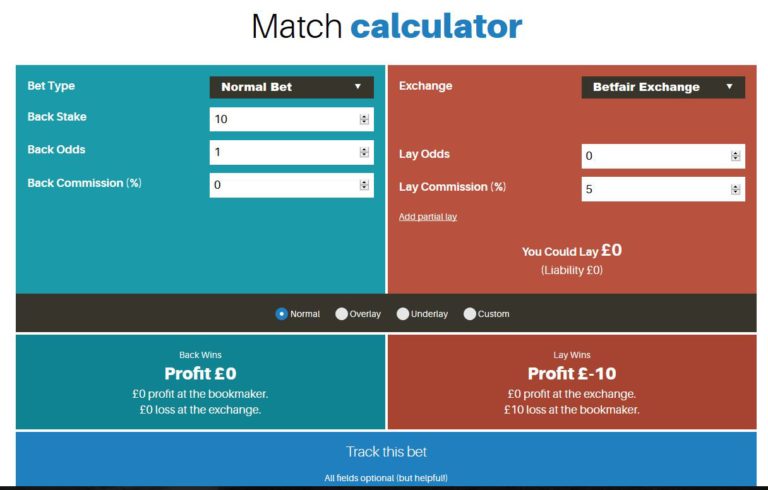
As well as standard matched betting calculations for qualifying bets and free bets, you can use it to calculate bonus on win, bonus on loss, enhanced odds as free bets, and several more. Pretty much any bonus situation is therefore covered. You can also use the calculator to work out what to do in the event of incomplete lays, and if you want to overlay or underlay a bet.
Forum
Likewise, every matched betting service needs a forum, where members can ask questions, share offers and opportunities, or just discuss anything matched betting related (or otherwise).
The Profit Squad forum (see below) is neatly set out and works well. It isn’t as busy as some forums, e.g. the one owned by the market-leading Profit Accumulator. There is plenty of good content, though, and staff are usually around to assist as required.
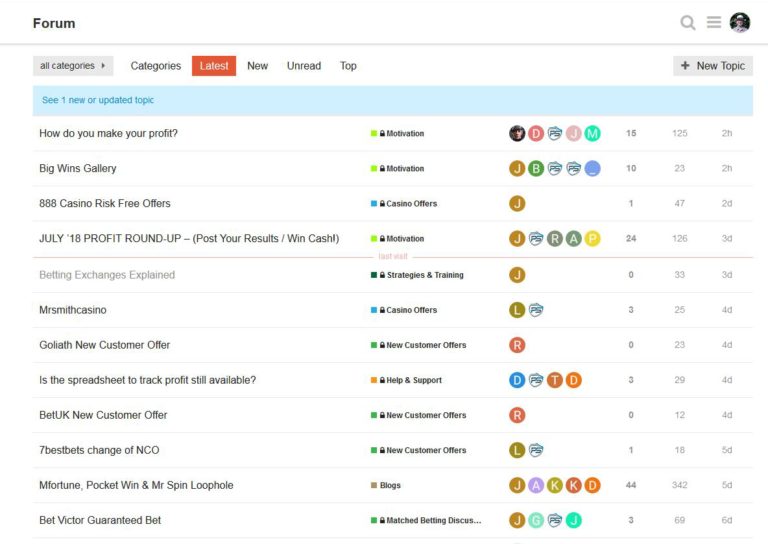
In addition to the forum, Profit Squad has a discord chatroom for members, which is great for discussing opportunities in real time.
Other Features
Profit Squad has a range of other features as well. If I tried to list them all this review would be at least double its already excessive length!
One tool I should definitely mention, however, is the Each Way Dutching Calculator. Each way dutching is a method of backing multiple or all runners in a horse race (or other event) with different bookmakers at their best prices. With suitable races this method can be more profitable than standard backing and laying, and it is also generally less hassle. Full information about how to use the Calculator is included in the training area, of course.
Another thing I should mention is that Profit Squad tracks all your betting activity automatically. It keeps a record of your profits and bet details, and displays them in your account. This makes it easy to see how you are doing overall, and does away with the need to maintain your own spreadsheets (although personally I still like to do this).
One final comment is that the site is fully mobile optimized – so if you like to bet on your smartphone, you should find using Profit Squad a pleasanter experience than with some rival services.
Pricing
Joining Profit Squad currently costs £15 a month. That is cheaper than most other matched betting advisory services, e.g. Profit Accumulator currently charge £17.99 a month. They don’t have a free trial offer like some other services, but for just £1 you can get a 14-day trial giving you full, unlimited access to the service. In many ways this is a better deal than the free limited membership offered by other services, as you can do as many bookmaker offers as you like (or can fit in) during your 14-day membership.
Closing Thoughts
Overall, I have been very impressed with Profit Squad. It offers high-quality matched betting training, and a comprehensive range of software tools, tips and information..
In my view it is particularly suitable for people who may already have some experience in matched betting, who are now looking for more advanced strategies to keep the money rolling in.
Profit Squad is particularly strong on online casino strategies, including slots, roulette and blackjack. I know from my membership of various matched betting Facebook groups that this is now a very popular approach among experienced matched bettors who have exhausted the bookmaker welcome offers. There are some risk-free casino offers, and others that may not be risk-free but have a positive ev (expected value). That means by the law of averages if you do these offers you will make a long-term profit, but will likely suffer some day-to-day losses. This is all covered in detail in the training, of course.
Profit Squad also have some of the best matched betting software tools I have seen, covering pretty much the entire range of bookmaker welcome and reload offers and more besides. About the only drawback I can see with it compared with a service such as Profit Accumulator is that the forum isn’t as active, but of course this is likely to change in future as more members join the service.
If you are thinking of giving matched betting a go – or are looking for an alternative advisory service featuring more advanced strategies – I strongly recommend checking out Profit Squad. They are adding new tools and features all the time, and joining now will ensure you have access to them at no extra cost. In any event, the 14-day trial for £1 is basically a risk-free opportunity to see everything they have to offer. Do just one risk-free offer during this time and you should cover your £1 outlay multiple times over.
As always, if you have any queries about Profit Squad or matched betting generally, please do post them below.
Disclosure: This review includes tracked affiliate links. If you click through and sign up with Profit Squad, I will receive a commission for introducing you. This will not affect the service you receive (or the price you are charged) in any way.










 Many thanks to Cora Harrison (pictured, right) for some great tips and resources.
Many thanks to Cora Harrison (pictured, right) for some great tips and resources.